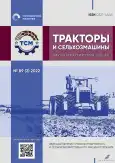Physical and chemical analysis of watered engine oil
- Authors: Kolunin A.V.1
-
Affiliations:
- Branch of Military Academy of Logistics (OABII)
- Issue: Vol 89, No 2 (2022)
- Pages: 141-148
- Section: Quality, reliability
- URL: https://journal-vniispk.ru/0321-4443/article/view/101115
- DOI: https://doi.org/10.17816/0321-4443-101115
- ID: 101115
Cite item
Full Text
Abstract
BACKGROUND: The condition of engine chemistroils работыdefines reliability of piston engines operation additivessubstantially. However, colloid-chemical transformation, influenced by various factors, including oil watering, takes place in oils during storage and application. There is variety of ways how water may inflow in engine oils.
AIMS: The aim of the study is to reveal consequences of oil watering and negative influence of water on operational properties of engine oils.
METHODS: Watering of production engine oils was carried out in laboratory conditions. Mixes hazievof engine oils with water were prepared in various proportions. Influence of water on the condition of engine ёмкостoils уровнемwas estimated by visual observation, as well asокисления with application of the methods according to GOSTя and ASTM standards. The laboratory equipment, produced in Russia and the USA, provides comprehensible depth of scientific knowledge of physical and chemical processes.
RESULTS: The assessment of water influence on the engine oil condition was carried out on the basis of observation and the analysis of charactieristic curves. Change of concentration of additives, dissolved at the oil base, was estimated with change of base number and indicator elements.
CONCLUSIONS: The practical significance of this study involves integrity of the approach to the issueизменению of the engine oil condition change, influenced by water, regarding the concentration of the dissolved additives. Unjustifiably active processes of corrosion and wear of details surfaces are possible consequences of oil watering. Crankshaft bearings coating has the highest vulnerability to the influence of acids. The mentioned consequences have a negative impact on service life and reliability of piston engines operation.
Full Text
##article.viewOnOriginalSite##About the authors
Alexander V. Kolunin
Branch of Military Academy of Logistics (OABII)
Author for correspondence.
Email: kolunin2003@mail.ru
ORCID iD: 0000-0001-7151-8489
SPIN-code: 7483-9619
Associate Professor, Cand. Sci. (Engin.), Associate Professor of the “Maintenance of Armoured and Automotive Vehicles” Department
Russian Federation, OmskReferences
- Boltanina MA. Kolloidno-khimicheskie prevrashcheniya v maslakh pri obvodnenii [dissertation]. Moscow; 2001. Available from: https://tekhnosfera.com/kolloidno-himicheskie-prevrascheniya-v-motornyh-maslah-pri-obvodnenii (In Russ).
- Kolunin AV, Bur’yan IA, Gel’ver SA. Influence of the Arctic climate on watering of engine oils in operating conditions of road transport. Journal of Physics: Conference Series. 2019;1260(6). doi: 10.1088/1742-6596/1260/6/062012
- Khaziev AA., Laushkin AV. Prichiny obvodneniya motornogo masla v ekspluatatsii. Vestnik MADI. 2012;(1):63–67. (In Russ).
- Korneev SV, Dudkin VM, Kolunin AV. Water contamination and colloidal stability of motor oils. Chemistry and Technology of Fuels and Oils. 2006;42(4):273–275. doi: 10.1007/s10553-006-0071-6
- astm.org [Internet]. ASTM D7417-17 Standard Test Method for Analysis of In-Service Lubricants Using Particular Four-Part Integrated Tester (Atomic Emission Spectroscopy, Infrared Spectroscopy, Viscosity, and Laser Particle Counter) Available from: https://www.astm.org/d7417-17.html
- Trembach EV. Motornye masla, dobavki, prisadki. Moscow: Feniks; 2000. (In Russ).
- Nepogod’ev A.V. Mekhanizm okisleniya masla v porshnevykh dvigatelyakh. Khimiya i tekhnologiya topliv i masel. 1977;(4):34–37. (In Russ).
Supplementary files












